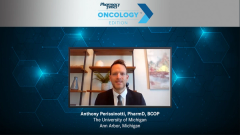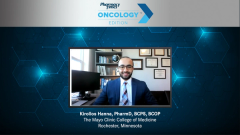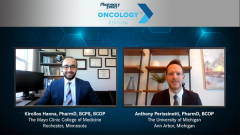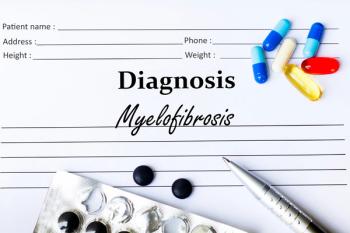
Chronic Lymphocytic Leukemia: Considerations for Pharmacists
Drs Anthony Perissinotti and Kirollos Hanna provide some important considerations for pharmacists in treating chronic lymphocytic leukemia.
Episodes in this series

Kirollos Hanna, PharmD, BCPS, BCOP: We talked about a lot of exciting things. Dr Perissinotti, why don’t you take us through what the role of the pharmacist is in the management of CLL [chronic lymphocytic leukemia]? We talked about treatment selection and strategies. But what can pharmacists do, or how can pharmacists become more involved in caring for these patients with CLL?
Anthony Perissinotti, PharmD, BCOP: Obviously, when you think of pharmacists, you think of our traditional role of ensuring that patients are adherent to therapy, that there are no drug interactions, there are no contraindications, that we’re selecting the right therapies based on comorbidities and whatnot. You certainly think about the pharmacist in helping with access, especially when it comes to combinations. When you’re now going to be adding 2 drugs, oral therapies that cost roughly $15,000 per month each, copay assistance is going to be incredibly hard. Getting funding for these—we’re going to run out of funding, so trying to develop strategic strategies to get patients’ therapy. Now, access, I don’t think a pharmacist should do. I think we should really advocate having support staff to be able to do this. That way, we can free up our pharmacists to really advance our practice. I think the biggest thing we really need to push ourselves to do is read the data. Read through all the literature. We went through so many studies, and this was just primarily study at ASH [American Society of Hematology 2021 Annual Meeting]. There are so many other studies out there. Keeping up with this is incredibly daunting and challenging. Just to read this information took us hours to prepare. Then you have to then apply these data to your patients, so that takes a tremendous amount of time also. And then you have to educate your physician colleagues and your nursing colleagues. I really think the role of the pharmacist should be critically appraising all this literature and identifying how we should be treating our patients in the clinical arena. And this is not only developing clinical pathways for the 80% of patients that this fits, but also for those individual patients that cookie-cutter medicine doesn’t work for so that we can think outside the box of what therapy is best for certain patients. I think those are some of the things that we should do as pharmacists. We should really push ourselves and really advance our profession by continuing to read, learn, and know everything there is about all the little nuances of the literature.
Kirollos Hanna, PharmD, BCPS, BCOP: I couldn’t agree with you more, Dr Perissinotti. A couple of other things that I think would be very important for our pharmacists to consider, as you mentioned, drug-drug interactions. Those are key. Almost any patient that’s going to be treated with CLL therapy, 3A/3A4 inhibition; that’s going to be critical. BTK [Bruton tyrosine kinase], BCL2 [B-cell lymphoma 2], PI3K [phosphoinositide 3-kinase], really all the above. Another thing is infectious prophylaxis. So sometimes our pharmacists can have key interventions in terms of making sure that we make recommendations for certain patients that could be at high risk for developing infectious complications. We mentioned COVID-19 vaccinations earlier and what the implications there are, especially in those patients receiving anti-CD20 monoclonal antibodies. That’s going to be very important. Another thing, Dr Perissinotti, you had mentioned earlier is the absorption of these drugs. All our BTK inhibitors can be taken with or without food. But outside of acid suppression, etc, high-fat, high-calorie meals actually impact ibrutinib [Imbruvica] and acalabrutinib [Calquence] absorption. So those are also things that, although we can take with or without food, we have to be cognizant of and be aware of in terms of clinical practice. Some patients may require growth factor prophylaxis. Pharmacists can play a role in terms of developing pathways for institution; being part of that team, how you evaluate the data that Dr Perissinotti had just mentioned, again, outside of ASH; and incorporating that into your clinical practice and developing guidelines, your care model, your value-based care; and trying to move that needle forward. Whether it is indefinite treatment with BTK, finite treatment with BCL2 anti-CD20. Whether you break it down based on subsets of patients. All those are going to be critical strategies for your patients. And again, the amount of evolution that we’re seeing, that amount of combinations, sequencing the therapy is going to be very, very critical to success for these patients.
Anthony Perissinotti, PharmD, BCOP: Well, that was a really great discussion. I want to thank you Dr Hanna, for all of your comments. I was going to say, “Let’s open it up for more discussion to see what other unmet needs we have,” but we really talked about it all. I want to just thank the audience, everybody that’s viewing this, for your undivided attention. And I hope that you learned a thing or 2 from me and Dr Hanna. It’s been a pleasure. Hope that you found this Pharmacy Times®Insight to be rich and informative. And with that, have a good evening.
Transcript edited for clarity.
Newsletter
Stay informed on drug updates, treatment guidelines, and pharmacy practice trends—subscribe to Pharmacy Times for weekly clinical insights.





























